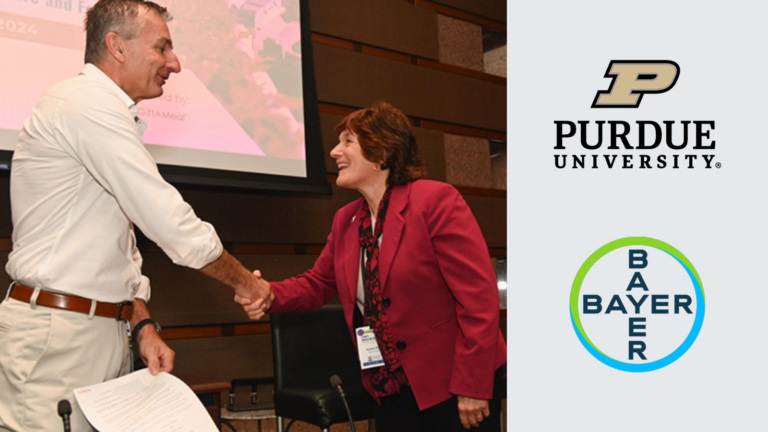New consortium to focus on data-driven, holistic approach to create sustainable and resilient farming practices
On Thursday (Sept. 19), Purdue University and Bayer announced the creation of the Coalition for Sustainable and Regenerative Agriculture, a public-private partnership designed to help improve the soil health of farmland while also increasing food production for a growing population.
The coalition’s mission is to generate robust, real-world data in support of regenerative agriculture practices to help farmers restore soil health and biomass, increase biodiversity, and improve the resiliency of ecosystems over time. The coalition’s new framework will also support education and outreach programs to enhance sustainable and regenerative agriculture.
The coalition will be administered through Bayer at Convergence, the company’s innovation center at Discovery Park District at Purdue.
“America’s farmers are already global leaders in providing food worldwide, supplying a substantial amount of grain, meat and other agricultural products,” said Karen Plaut, Purdue’s executive vice president for research. “But with population projections of 9 billion people in the coming years, it’s critical to provide the tools necessary to support those farmers who are called upon to produce even more while also serving as stewards of the land. As a land-grant institution, Purdue is proud to partner with Bayer to find innovative solutions to improve agronomic practices.”
The coalition’s goal is to accelerate the adoption of agricultural systems that restore soil, water and wildlife while making farms healthier and more resilient. The partners say there is a growing need for innovative solutions at scale to address environmental concerns and to create positive, measurable impact to incentivize producers.
“I couldn’t be more excited to see us working alongside like-minded partners — such as Purdue University — who are committed to helping scale regenerative ag practices,” said Bob Reiter, head of research and development at Bayer’s Crop Science Division. “Through our suite of technologies, we are able to leverage these innovations and help facilitate regenerative ag practice adoption that boosts farmer productivity and creates maximum impact for the environment.”
The coalition aims to deliver science-based recommendations and standardized metrics, tailored by crop type, region and climate, in conjunction with digital tools and robust validation systems.
To achieve this vision, the coalition will focus on several key areas:
- Climate-smart agriculture: Integrate technology to adapt to changing weather patterns, improve water management and optimize resource use.
- Regenerative practices: Develop more robust practices that capture and store carbon in the soil. Promote techniques that improve soil health and biodiversity and enhance long-term productivity.
- Farmer empowerment: Provide farmers with the tools, knowledge and resources they need to adopt sustainable practices and access premium markets for their products.
- Profitability and policy advocacy: Provide additional scientific research that supports or incentivizes sustainable practices for farmers and landowners.
The coalition will leverage previous investments in digital phenotyping capabilities at Purdue Agronomy Center for Research and Education (ACRE) and at the Purdue Agricultural Centers (PACs) and will utilize dynamic and relevant Extension programs, strength in collaborative research across colleges, and support for related projects that are underway. It will build on these existing strengths to create test beds for sustainable and regenerative agriculture technologies that provide demonstrations for a wide variety of agricultural production systems and technologies — regardless of farm scale or end product.
This public-private partnership is expected to evolve and expand to other partners from the agricultural sector, allowing for an even larger network of field sites to test and collect data on this more holistic approach to farming.
The newly signed agreement is the latest in an ever-expanding partnership. Following an announcement in June 2020, Bayer opened an innovation and collaboration space at the Convergence Center. It serves as the physical hub of the new coalition.
“I am thrilled to see Bayer and Purdue taking the ongoing partnership to a new level and enabling the creation of a world-class research hub focused on regenerative agriculture,” said Susana Diaz, innovation manager and head of Bayer’s innovation center at Purdue. “This initiative will help farmers produce more and unlock downstream value, while actively restoring nature.”
The announcement was made in conjunction with Bayer’s Climate Innovation Day, a two-day summit of leaders and stakeholders in agricultural innovation, climate issues and food sustainability initiatives.

